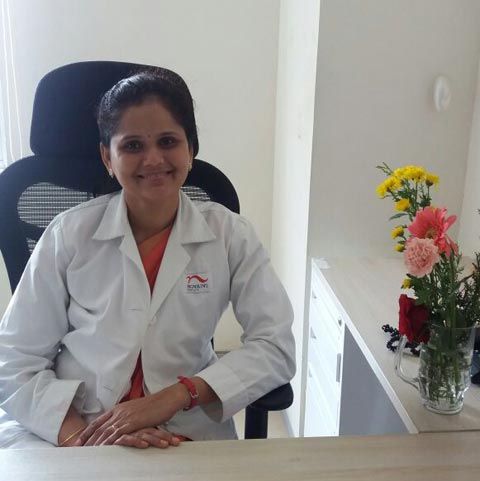No. of views : (4066)
Busting the myths about Infertility treatment
Posted on: 22/Mar/2018 3:37:31 PM

Infertility is on the rise in India owing to several lifestyle changes. With 1 in 6 couples being diagnosed with infertility in India every year, research suggests there has been a 20-30 percent rise in infertility cases the last five years. A whopping 30 million couples in India are estimated to be infertile! Once a couple is diagnosed with infertility, divergent suggestions and advice from family and friends follow. In most cases, these advice are well meant but incorrect. This gives rise to several misconceptions about infertility.
Dr. Krithika Devi, Fertility Consultant at Nova IVI Fertility, Chennai says, �If a couple is unable to conceive after one year of trying (6 months if age of the woman is over 38), the best thing to do is talk to the doctor immediately. A fertility specialist can help couples clear all doubts and misconceptions about the problem and recommend accurate treatment options. Online resources can be a quick way to get information, but one has to be cautious about the authenticity of the source. IVF is not that mysterious or scary when one learns the facts.�
In addition to offering the best infertility treatment, Nova IVI Fertility also aims to create awareness about the subject and educate patients and their families with the right information so that they are not misled. Listed below are some of the common myths that surround infertility.
MYTH: Women can conceive at any age through IVF
Age is no barrier to achieving many things. But it can reduce the chance of a couple giving birth to a healthy child. A woman�s age is one of the most important factors in conception, be it natural or assisted. The ideal age for women to achieve pregnancy is between 25 and 35 years. A lot couples delay pregnancy until they are financially stable and well-established in their careers. However, many have the misconception that a woman can conceive through IVF anytime.
The truth is, the quality and quantity of eggs start declining from the age of 38 in most women, thereby causing difficulties in conceiving. As women age, other complications also rise, thereby leading to a high risk pregnancy even if successfully conceived. Moreover, conditions such as endometriosis and unexplained infertility make it a challenge for women to conceive even through IVF.
�The success of IVF depends on a number of factors apart from the quality of the eggs and the sperms, such as the condition of the woman�s uterus or receptivity of endometrium, undamaged fallopian tubes, and other biological and hormonal conditions. Hence, it is important for women to plan pregnancy as early as possible, and when the infertility diagnosis is made, they should not delay taking the treatment,� says Dr. Krithika.
MYTH: IVF guarantees 100% success; there�s no hope after the first IVF failure
�Studies have reported that the global average success rate of one cycle of IVF is about 35%. Though we would like all of our patients to achieve a successful pregnancy, unfortunately, there is no infertility treatment that always works for everyone. The likelihood of a successful IVF cycle is impacted by a number of factors as mentioned earlier. So, it is important to understand from the fertility specialist what the underlying cause of infertility is. The more i informed one is, the better they will understand what IVF success entails,� adds Dr. Krithika.
For a majority of the cases, IVF often is successful over two or three cycles based on the learnings from the previous failures. That is why couples should continue the treatment with positivity until pregnancy is achieved. Dropping out after one failed attempt to try again later will only further reduce the chances of pregnancy in the future.
MYTH: IVF involves donor gametes only
IVF is usually done with the wife`s eggs and the husband`s sperm unless indicated otherwise. There are chances that even women with a low ovarian reserve or men with Azoospermia (absence of viable sperms in the testes) may conceive with their own gametes. Donor gametes are advised only in selective situations, like advanced maternal age, premature ovarian failure, menopausal women, or men with no sperms even after surgical retrieval. Donor gametes are used only after adequate counselling and proper consents.
MYTH: Stick to bed rest after IVF
There`s no need to put one�s life on pause after the embryo transfer. This idea is an absolute myth. An IVF pregnancy has to be treated like a normal pregnancy. IVF is nothing but an assisted process in bringing the husband�s sperm and the wife�s egg together to form an embryo. Since this process is not possible inside a woman�s body either because of tubal blockage or unhealthy sperms or other reasons, IVF helps in bringing the gametes together in a laboratory. Once the embryo goes back into the woman�s body, it needs care just like a naturally conceived embryo. Women can go back to their routine and the usual pregnancy care should be taken.
MYTH: IVF always results in twins and triplets
While it is true that multiple pregnancies are more common in those undergoing IVF treatment than in those having a natural pregnancy, advancements in ART techniques allow for effective single embryo transfers these days.
It�s a fallacy that more embryos need to be transferred after IVF/ICSI for better chances. Multiple embryo transfer can cause major problems because a woman�s womb is meant to carry only one foetus. The risk involved is high as it poses a threat to both the mother and the new-born baby during and after pregnancy. That is why doctors now-a-days recommend elective single embryo transfer (eSET) thanks to the advanced technology available to select the healthiest and most viable embryo.
MYTH: Babies end up with genetic abnormalities when conceived through IVF
On the contrary, advanced ART techniques like Preimplantation Genetic Screening (PGS) and Preimplantation Genetic Diagnosis (PGD) allow accurate detection of chromosome errors in the embryo before transfer, increasing the chances of a healthy and genetically normal baby. Chromosomal abnormalities are responsible for more than 50% of miscarriages in early pregnancy. Chromosomally abnormal embryos may lead to birth defects in the babies. Fertility specialists are vouching for the modern technologies like PGS and PGD, which have a predicted accuracy of 98% for detecting any chromosomal abnormalities in the embryos.
For more inquiries please contact:








